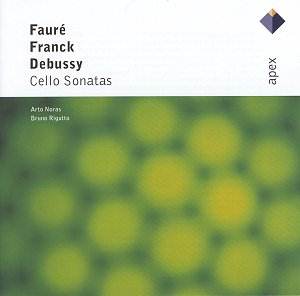 Composer: César Franck (1822-1890), Gabriel Fauré (1845-1924), Claude Debussy (1862-1918)
Composer: César Franck (1822-1890), Gabriel Fauré (1845-1924), Claude Debussy (1862-1918)
Works: Sonata for cello and piano (originally for violin and piano), Sonata for cello and piano No. 1 in D minor Op. 109, Sonata for cello and piano
Performers: Arto Noras, cello; Bruno Rigutto, piano
Recording: Järvenpää Hall, Finland, November 1995
Label: TELDEC APEX 0927 40599 2 [56.26]
César Franck, a composer whose late works epitomize the romantic spirit with a bold harmonic language, is represented here through his Sonata for cello and piano, a transcription of his more famous violin sonata. The original composition, crafted for the virtuoso Eugène Ysaÿe, showcases Franck’s gift for lyrical melody and structural innovation. Franck’s oeuvre, particularly from the 1880s onward, reflects a turning point in his compositional style, moving towards a more personal and emotional expression, which resonates well with the cello’s rich timbre, albeit with some loss of the original’s buoyant character.
Arto Noras, alongside pianist Bruno Rigutto, navigates the complexities of these works with impressive artistry. Noras’s tone is lush and expressive, particularly accentuating the cello’s upper register in Fauré’s Sonata, where the instrument truly soars. Fauré’s work, composed during the final throes of World War I, carries an introspective weight, steeped in the harmonic tradition of his mentor Saint-Saëns. The reflective quality of the slow movement is particularly poignant, and Noras’s nuanced phrasing captures the inherent sadness as well as the contrasting exuberance of the finale. Rigutto’s accompaniment is exemplary, providing a solid yet unobtrusive foundation that allows Noras’s playing to shine.
The recording quality merits special mention; the sound is bright and clear, facilitating a rich interplay between the cello and piano. The engineering captures the subtleties of dynamic shading, particularly in Debussy’s Sonata. Composed during a challenging period of his life, Debussy’s work showcases a unique blend of lyricism and tension. The opening Prélude, with its dramatic contrasts, is rendered with a palpable energy by Noras, whose interpretation is both bold and sensitive. The whimsical second movement, originally titled “Pierrot is angry at the moon,” finds a playful spirit in Noras’s deft execution of pizzicato passages and harmonic explorations.
While the transcription of Franck’s sonata for cello may detract slightly from its original brilliance, Noras’s performance compensates with a heartfelt interpretation that speaks to the cello’s expressive potential. Each work on this recording contributes to a cohesive narrative that captures the evolution of French cello music as the Romantic era waned. The partnership between Noras and Rigutto stands out in the Debussy, where their mutual understanding and attention to detail create a compelling musical dialogue.
This disc represents not only a commendable exploration of the French cello repertoire but also a testament to the enduring power of these compositions. The artists’ interpretive choices enhance the emotional depth of the music, providing a satisfying listening experience that resonates with both historical insight and technical prowess. As a valuable addition to the cello discography, it offers both seasoned listeners and newcomers alike a rich tapestry of sound that encapsulates a pivotal moment in classical music history.